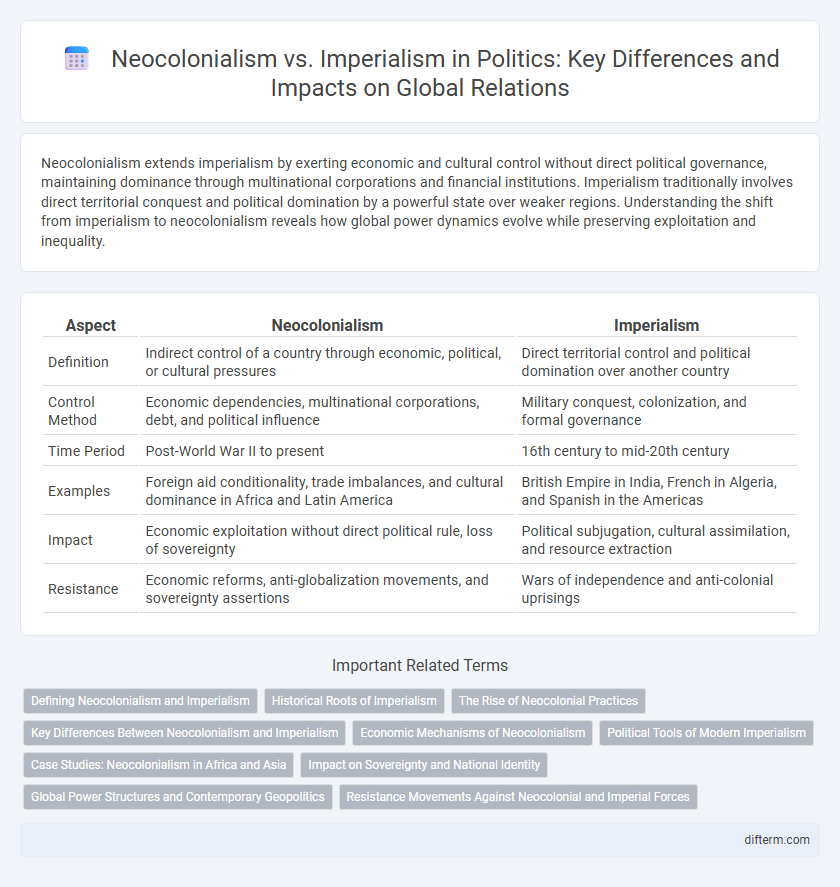Neocolonialism extends imperialism by exerting economic and cultural control without direct political governance, maintaining dominance through multinational corporations and financial institutions. Imperialism traditionally involves direct territorial conquest and political domination by a powerful state over weaker regions. Understanding the shift from imperialism to neocolonialism reveals how global power dynamics evolve while preserving exploitation and inequality.
Table of Comparison
| Aspect | Neocolonialism | Imperialism |
|---|---|---|
| Definition | Indirect control of a country through economic, political, or cultural pressures | Direct territorial control and political domination over another country |
| Control Method | Economic dependencies, multinational corporations, debt, and political influence | Military conquest, colonization, and formal governance |
| Time Period | Post-World War II to present | 16th century to mid-20th century |
| Examples | Foreign aid conditionality, trade imbalances, and cultural dominance in Africa and Latin America | British Empire in India, French in Algeria, and Spanish in the Americas |
| Impact | Economic exploitation without direct political rule, loss of sovereignty | Political subjugation, cultural assimilation, and resource extraction |
| Resistance | Economic reforms, anti-globalization movements, and sovereignty assertions | Wars of independence and anti-colonial uprisings |
Defining Neocolonialism and Imperialism
Neocolonialism refers to the indirect control or influence exerted by powerful countries over weaker nations through economic, political, and cultural pressures rather than direct military or political rule. Imperialism, in contrast, involves the direct extension of a nation's sovereignty over foreign territories through colonization, military conquest, or formal annexation. While imperialism relies on overt domination, neocolonialism operates through subtle mechanisms like multinational corporations, international financial institutions, and diplomatic influence.
Historical Roots of Imperialism
The historical roots of imperialism trace back to the Age of Exploration in the 15th century when European powers expanded their territories through colonization and conquest, exploiting resources and indigenous populations. Imperialism established global power hierarchies through direct political control and economic domination, often justified by ideologies like Social Darwinism and the civilizing mission. Neocolonialism emerged as a modern extension, maintaining economic and cultural influence over former colonies despite formal political independence.
The Rise of Neocolonial Practices
Neocolonialism manifests through economic control, cultural influence, and political pressure exerted by powerful nations over developing countries, often via multinational corporations and international financial institutions. The rise of neocolonial practices is marked by strategic resource extraction, debt dependency, and trade imbalances that undermine national sovereignty. These mechanisms perpetuate inequality and hinder genuine development, contrasting with the overt territorial conquest characteristic of traditional imperialism.
Key Differences Between Neocolonialism and Imperialism
Neocolonialism differs from imperialism primarily in its subtle economic and political control mechanisms, avoiding direct territorial conquest while maintaining dominance through financial dependence and multinational corporations. Imperialism typically involves overt military conquest and direct governance over colonies, illustrating clear territorial expansion and political subjugation. Neocolonialism exploits globalization and international institutions to perpetuate influence, contrasting imperialism's reliance on formal empire-building and colonial administration.
Economic Mechanisms of Neocolonialism
Neocolonialism employs economic mechanisms such as debt dependency, unfair trade agreements, and multinational corporate dominance to maintain control over developing nations without direct political rule. These economic tools perpetuate unequal power dynamics by restricting growth opportunities and enforcing resource extraction for the benefit of former colonial powers. Unlike traditional imperialism, which relies on territorial conquest, neocolonialism manipulates global financial institutions and market access to sustain influence.
Political Tools of Modern Imperialism
Modern imperialism employs political tools such as economic policies, diplomatic pressure, and covert operations to maintain control over less powerful nations, often under the guise of neocolonialism. These tools include the manipulation of international institutions, strategic alliances, and conditional aid to influence the political and economic decisions of sovereign states. This form of control perpetuates dependency and limits true sovereignty, distinguishing it from traditional imperialism's overt territorial conquest.
Case Studies: Neocolonialism in Africa and Asia
Neocolonialism in Africa and Asia manifests through economic dependency, where multinational corporations and international financial institutions exert control over resource-rich countries, limiting their sovereignty and development. Key case studies include Nigeria, where oil revenues fuel foreign interests, and Indonesia, where resource extraction benefits foreign powers under the guise of economic aid. This modern form of domination contrasts with classical imperialism's direct political rule, emphasizing economic exploitation and cultural influence while maintaining the facade of independence.
Impact on Sovereignty and National Identity
Neocolonialism subtly undermines sovereignty by exerting economic and political control through multinational corporations and international financial institutions, often masking direct interference. Imperialism, characterized by outright territorial conquest and governance, imposes foreign rule that directly erodes national identity and autonomy. Both impact sovereignty and national identity, but neocolonialism operates through indirect mechanisms that maintain a facade of independence while perpetuating dependency.
Global Power Structures and Contemporary Geopolitics
Neocolonialism perpetuates global power imbalances through economic dependence and political manipulation by multinational corporations and Western states, contrasting with traditional imperialism's direct territorial control. Contemporary geopolitics reveals how former colonial powers maintain influence via trade agreements, military alliances, and financial institutions like the IMF and World Bank. This evolving dynamic entrenches unequal sovereignty and shapes global governance, impacting developing nations' autonomy in international decision-making.
Resistance Movements Against Neocolonial and Imperial Forces
Resistance movements against neocolonial and imperial forces have significantly shaped global political landscapes, showcasing the persistent struggle for sovereignty and self-determination. Groups such as the Algerian National Liberation Front and the Vietnamese Viet Cong mobilized both guerrilla tactics and international support to challenge domination driven by economic exploitation and political control. These movements highlight the critical intersection of local agency and global geopolitics in contesting external domination and promoting post-colonial state-building.
Neocolonialism vs Imperialism Infographic

 difterm.com
difterm.com